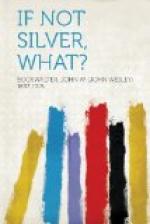Another class threaten us that a great mass of securities will be “unloaded on us.” Well, Great Britain, Germany, and Holland, all gold countries, are the nations which hold practically all the American stock and bonds held abroad. Of course they did not invest expecting to be paid principal and interest in coin, for they know that there is not enough in this country to pay it; it is in commodities that we must pay. So far as these securities are bad, as we are sorry to say very many are, foreigners having been badly “plucked” by some of our operators, they will be returned anyhow. In fact, they are coming back now. As to those which are good, being held against property capable of earning a steady and reliable income, they will not be returned. Held in gold countries, the interest and dividends on them will be paid in our products measured in the currency of those countries, no matter what our monetary system may be.
But suppose the “prophets” of evil are correct to this extent that silver and securities will be “dumped” on us to the amount of a billion or two. Will the foreigners give us all these good things? Assuredly not. They must all be paid for; and with what? Manifestly with agricultural products, for there is little or nothing else. The farmer must furnish the stuff, and he is ready and willing to do it—yes, anxious. At least three-fourths of our exports are agricultural, and of the new exports probably seven-eighths would be. We find, moreover, that in 1891 55,131,948 bushels of wheat exported brought us $51,420,272, and in 1892, 157,280,351 bushels brought us $161,399,132, while in 1894 the 88,415,230 bushels exported brought us only $59,407,041, and in 1895, 76,102,704 bushels brought us but $43,805,663. Similarly it may be shown that our largest cotton exports have brought us the least money; but this is an old story. It goes without saying, that to the farmer there are three great factors in the present situation: a ruinously low price for his products, a tremendous surplus left over from last year, and an immense crop for this year now adding to the surplus, with no possible home consumption to give an adequate outlet. Suppose then the “dump” should come and the farm produce go—what then?
First of all there must come as a result a rise in prices. Farmers receiving much more money would immediately pay their most pressing debts; the release of idle money would break the deadlock which now paralyzes trade, and from the farmer the money would at once be poured into the channels of rural business. The consumptive demands would be tremendous because of the long and forced abstinence, and the farmer would supply himself with those things he has so long wanted. The railroads would have a vastly increased business, and as a result there would be a greatly increased demand for labor. Instead of the ruinous “cut in rates” which we read of almost every day, made in order to stimulate the movement of crops, we should soon hear of vastly increased shipments at profitable rates; these of course would soon be followed by increased net earnings, which would in time create increased values of securities, which again would check foreign sales and stimulate purchases. There would be a boom in stocks to dispel the gloom of Wall Street, and we should do the money-mongers good in spite of themselves.




